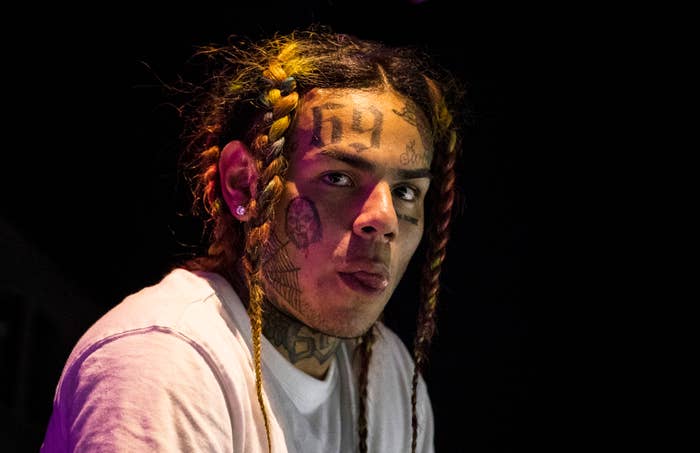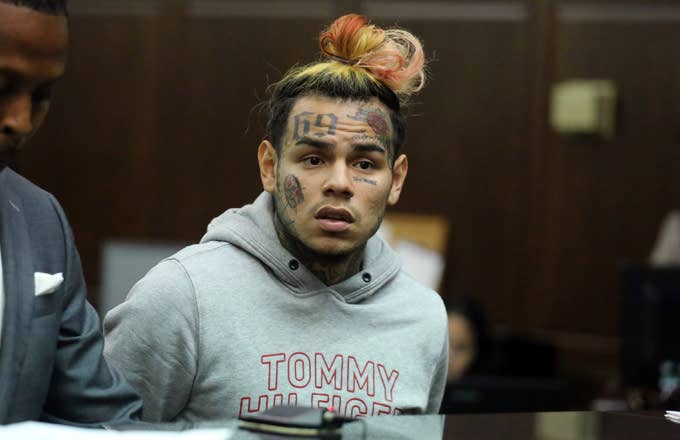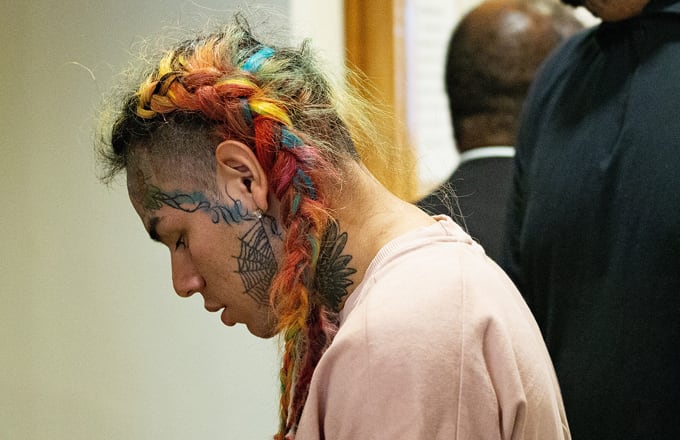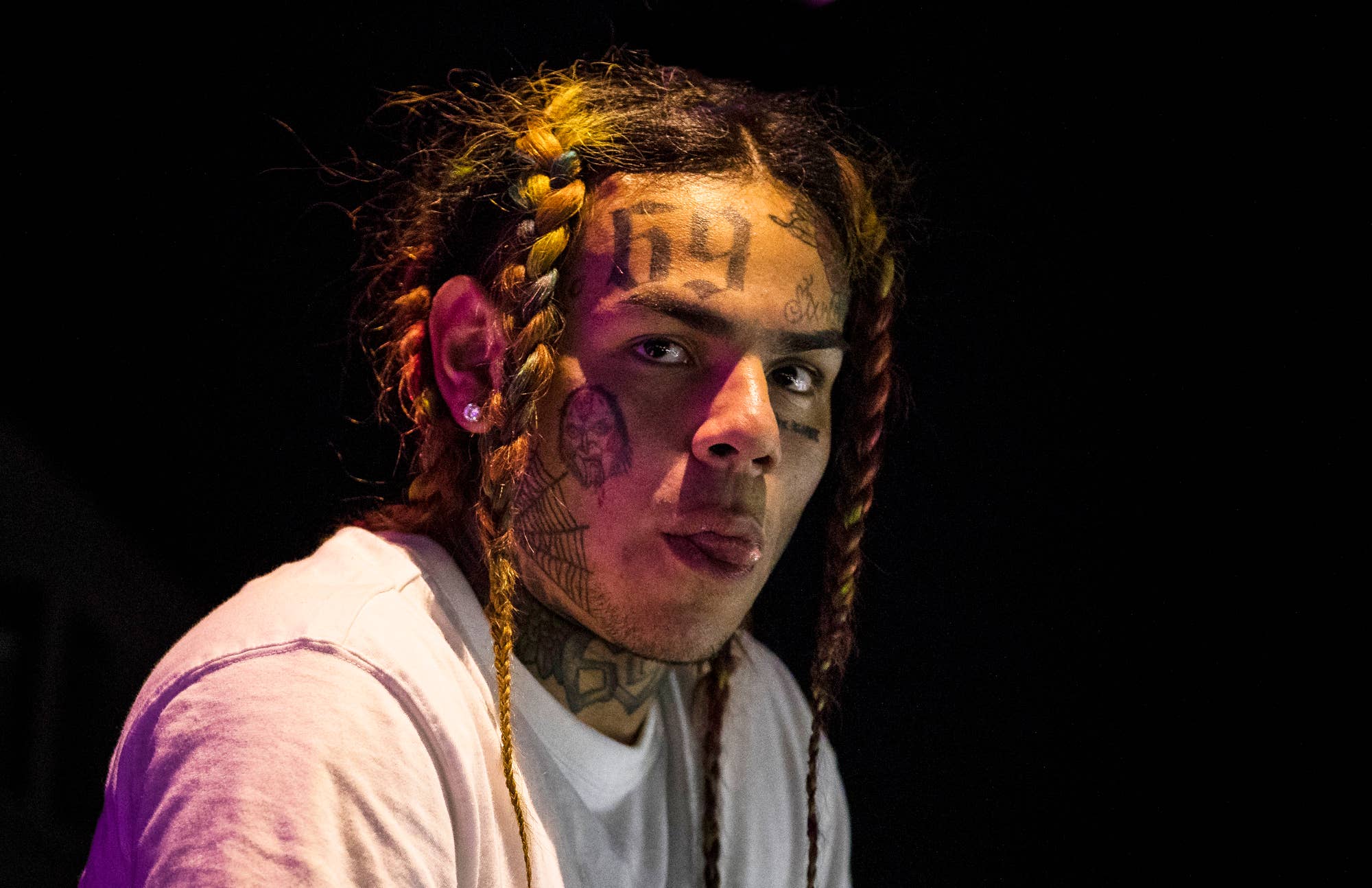
When 6ix9ine was arrested on racketeering charges this week, casual rap fans without law degrees were faced with a lot of questions: What does racketeering really mean? How likely is it that 6ix9ine will actually be served with a life sentence? What is his best-case scenario? Can he negotiate his minimum sentence?
To get some context on 6ix9ine's legal situation, we spoke with someone who has decades of experience working with racketeering and RICO cases. Adam Bercovici spent 30 years with the LAPD, retiring as lieutenant II of the Robbery-Homicide Division, Homicide Special Section. He has also worked on private investigations for entertainment industry clients, and now serves as a producer for a documentary crime series that’s in pre-production.
Explaining that racketeering is based on group activity, Bercovici says, “If [6ix9ine] profited from it or he was involved in decision making, he doesn’t have to pull the trigger or anything like that. He just has to be there.”
Discussing the likelihood that 6ix9ine and his four associates allegedly affiliated with the Nine Trey Bloods will actually see life sentences, Bercovici points out that deals are often offered in situations like this. “Typically, deals are made because you have multiple people involved and everybody goes out and gets their own attorney,” he says. “That’s kind of what law enforcement counts on, that everybody rats everybody out. That’s what we hope.”
Here’s everything he had to say about 6ix9ine’s case.

What is your background in racketeering cases?
I am a retired Los Angeles Police Department lieutenant, and I did 30 years at the LAPD before retiring in 2012. During the course of my career, specifically as a lieutenant and officer in charge of units, I worked several cases in which RICO and racketeering were directly involved. That included assignments in the Violent Crimes Task Force and the Interstate Task Force as an officer in charge, as well as the Joint Terrorism Task Force.
What exactly does racketeering and RICO mean?
Racketeering itself is part of a RICO, which stands for Racketeer Influenced and Corrupt Organizations Act. It was passed in 1970 by the federal government. Racketeering means illegal business activities or the extortion of money from people. It’s usually associated with organized crime and organized efforts to maintain influence, and allowing that criminal activity to proceed.
There is a whole series of crimes that come under racketeering: robbery, bribery, extortion, arson, gambling, and kidnapping. And you need a group of people to do it. One person cannot racketeer on their own. He needs to have a criminal enterprise. That’s why racketeering is so often associated with organized crime. So when you hear the word racketeering, that means a group of people got together in a conscientious effort attempted to promote, engage in, and profit from criminal activity by a series of violent acts.
If you look at RICO cases, deals are being made. People make deals.
So for 6ix9ine to get in trouble in a racketeering case, do they only have to prove that he’s associated with the group? He doesn't have to be explicitly tied to any of the specific crimes?
Yeah. If he profited from it or he was involved in decision making, he doesn’t have to pull the trigger or anything like that. He just has to be there. Often, in a racketeering case, a RICO case, there’s a shot caller, and that’s yet to be determined.
It looks like they’ve been working on the indictments for some time. That's because a racketeering case involves all kinds of things, like wiretaps and different resources that we use to get information. It’s not like we go out and say, we’re gonna make a RICO case. Typically, when you look at a criminal case and you say, “It looks like we have a racketeering case with a possibility for a RICO indictment,” it’s a long process. You have multiple people you have to investigate. You have to draw connections between multiple people. You have to use multiple resources, and those could be anything from surveillance to phone conversations, and draw all of that together to make a connection that all of these individuals were involved in a criminal enterprise. Again, the connection with the criminal enterprise is that they have to be involved in some type of violent act.

6ix9ine has been publicly shouting out the name Tr3yway in his music and on social media. Is that enough evidence for them to directly tie him in with the group's criminal activity? Or do they need to explicitly have other evidence?
I want to be very careful speaking on this as a former law enforcement officer, but I would say that in order to make a tight case, you’re going to need more than that. And I would assume they have more than that. But it certainly would indicate, from a face value, that he’s involved. That’s what I would get out of it. But if a guy yells all this stuff out and shows allegiance and interest in the game or is affiliated with it, is that enough to send him to prison for the rest of his life? No. You have to have a lot more than that.
The news that he's facing life in prison took over all the headlines. Realistically, what do you think the chances are that he'll actually see a life sentence?
Yeah, that’s salacious stuff. “Life in prison” is salacious stuff. I don’t know all the details of the case, so I can only speak generally on this. But typically, deals are made, because you have multiple people involved and everybody goes out and gets their own attorney. That’s kind of what law enforcement counts on, that everybody rats everybody out. That’s what we hope.
I think it’s too early to say who’s going to jail for the rest of their life. This young rapper’s attorney might tell him, “Cooperate so you don’t go to jail.” But if you look at RICO cases, deals are being made. I would say the chances are pretty good that people are going to start making deals. Now, there are cases where the violence that was committed by the group is heinous, and that typically comes in with torture, kidnapping, and murder. Then you’re going to have a hard time, specifically with people who have direct involvement in that act.
But I would say to just see what happens. I think it will play itself out over a long time. You’re probably looking at a couple years of the trial, at least. Then there's the course of the trial and interviews and all the other things that happen. Also, I was reading a bit about his prior criminal history. He’s got some things that could influence a sentencing.
Does it have the weight of a life sentence? Probably not. But it could certainly influence his deal-making. Think about it for yourself. You get involved with a bunch of knuckleheads and some stuff goes sideways. You were just having a good time, not thinking you were gonna get caught, and all of a sudden some very serious FBI agents and federal prosecutors tell you, “You’re going to go to prison for the rest of your life.” Then your lawyer says, “Don’t worry about it. I’ll talk to them.” Then they come back and they offer you federal probation—or they offer you a couple years if you just have to rat everybody else out. People do that all the time.
In a separate case, he was recently put on probation. Will that factor into this case?
Yeah, it’ll definitely factor into the decision. It’ll factor into two things: his motivation to make a deal, and the sentencing that he’s going to get. My experience in federal cases is there is going to be some kind of a prison sentence. It’s just the length of it that we don't know yet. It’s not like you’re going to get to walk away unless somebody completely rolls over and they go into witness protection and disappear. But based on what I’ve read, it sounds like he’s pretty involved in this thing on some level. So he’s probably going to end up having some kind of a sentence.
But I hope that your readers understand that this is all in flux right now. He just got arrested the other day. I’m sure there’s wheeling and dealing and all kinds of stuff going on right now. But I would imagine that he would be smart and his lawyer would figure out a way that he can come out of this as unscathed as possible. Unless—and I want to be clear about this—unless the evidence proves that he is so deeply involved that the federal prosecutors are going to say, “No, he’s got to serve the max time.” It’s unknown at this point. It really is.
One thing that’s getting thrown around a lot is the phrase “mandatory minimum sentence.” The racketeering charges alone have a mandatory minimum sentence of 25 years. What does “mandatory minimum” mean? Can that be negotiated down?
It can be negotiated down. The mandatory minimums mean that… Yeah, it can be negotiated. This is all in flux. Mandatory minimums mean that when the judge makes his ruling or sentencing, he has a mandatory minimum he has to adhere to, unless the prosecutors have come to him and said something. I’ll give you an example. Let’s say they go to this young man and he is part of the whole thing here and he’s just being stupid. There’s a lot of stupidity in this whole thing, from what I read. He just says, “I screwed up. I’m stupid. I’m an idiot and I’m gonna give everybody up so I can save my rap career.” Then his sentencing will be impacted if the information he gives is good enough. But if it looks like his acts are egregious enough, then that judge is going to adhere to certain sentencing guidelines.
Is there anything else we should know about racketeering charges?
Remember that racketeering activity legally requires a minimum of two acts of racketeering. So, robbery, bribery, extortion. Two acts of racketeering. Basically, to break racketeering down in a way that my kids could read it and understand... You get a bunch of people together and they’re trying to influence something in their criminal organization. They’re going to solve a problem or get rid of an obstacle or competition or something. They all get together, they all think about it, and they all figure out together, “We’re going to rob and kidnap some people to make this problem go away.” That’s what it is.

